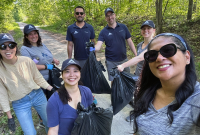These in-their-own-words pieces are told to Patricia Lane and co-edited with input from the interviewee for the purpose of brevity.
Ben Liegey founded BetterTable.ca to help the food service industry reduce waste and save money.
Tell us about your work.
Canadians waste 58 per cent of our food. And food waste is responsible for almost 10 per cent of greenhouse gas pollution. It is also inefficient, and too often, a needless contributor to high costs and low profit margins. Before the pandemic, a small minority of restaurants were either just breaking even or losing money. Now that figure is closer to half. Average profit margins are one per cent. Food costs are usually about seven per cent of overhead, so if waste can be measured, managed and reduced, that can really help.
Whether we work with a restaurant or hotel like the Huntingdon Hotel & Suites, the Oak Bay Beach Hotel in Victoria, the Pinnacle Hotel in Vancouver, or with a hospital, we start with a food audit. We seek to understand which food is coming back and why. Then, we consult everyone to make a plan. We talk to people in finance, human resources, marketing, servers, consumers and, of course, chefs. The solutions vary. Standardized portions might be inefficient, as they assume that a small person who gets little exercise will eat as much as a large person who has worked out. Takeaway boxes might not be offered. Perhaps a particular side dish is no longer popular, but the menu has not changed. Servers need as much training as they get in the Food Safe program, so they can help with food efficiency measures like helping people order a la carte when they don’t have a big appetite. In health care, perhaps the presentation can be improved, or the staff trained to know how to easily cater for particular preferences.
The enterprises with which we work report less waste and cost savings. They also report their staff like knowing their work is making a difference. Patrons enjoy knowing their consumer dollars are supporting regeneration.
Our free training and our Food Waste Prevention Certificate course is as essential to the industry as the Food Safe certificate.
What challenges do you face?
Lack of awareness. It is often taken for granted that there will be a full bin at the end of the shift, hiding the potential for cost savings and reducing climate impacts. Chefs rarely receive extensive food efficiency training. Fortunately, things are changing. We have participated in the Vancouver Food Policy Council, and currently co-chair the Food Waste Working Group for Metro Vancouver, as it redesigns its ten-year zero waste plan.
We are proud to be the second company in Canada to receive a Diamond Certificate from the Federal Net Zero Challenge.
I have also been co-producing Food Synergy, a full-length documentary to increase awareness across the entire food supply chain from farm to end of life.
Food waste is produced by a system, so it is necessary to take a systemic approach to change, but communication between the various silos of finance, human resources, marketing, serving, back of house and disposal may not always be strong.
What gives you hope?
There are so many working for improved food sustainability all over the world. We have a huge job to transform food systems to net-zero by 2050, but many hands make light work. Once people become aware of the combination of the business case, staff engagement, consumer satisfaction and reduced climate impacts as a package, resistance falls away.

How did you get involved?
I have made my career promoting sustainability, but the green premium can be a barrier, especially in tough times. Installing an industrial-sized heat pump might be the right thing to do but carries significant capital costs with long payback periods. Environmentally respectful cleaning products are more expensive. But the upfront costs associated with food waste reduction are small and the payback rapid. Once I understood the strength of the business case and the gap waiting to be filled, I was eager to help.
How did the way you were raised affect where you are now?
My father was born in the war years. He knew food scarcity. He grew food in our garden in France, and raised me to enjoy and celebrate food, preserve it for later use, and know when we had enough. At 10 years old, I was selling the surplus door to door in our town.
What is the future you are working toward?
I hope all our customers are able to reduce food waste by half by 2030 and get to net-zero by 2050. We have enough to feed everyone if we take care.
What would you like to say to other young people?
Find ways to reduce the energy you use for transportation and food. Travel is important to explore the world, and learning about other cultures improves the chances that we can have peace. But embrace slower options. You will learn more and do less harm. And eat more plants.
What about older readers?
Older people often waste less food. We need you to teach us how to live well in that way.







Comments
Stated: Food Waste constitutes almost 10% of Canadian GHG emissions. How can this be correct when (officially - the emissions reported to the IPCC; canada.ca/en/environment-climate-change/services/climate) peg waste from all sources at 3.3% in 2022 (not much different in other recent years. Hence, where did this 10% number come from.